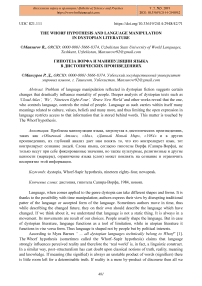The Whorf hypothesis and language manipulation in dystopian literature
Автор: Mansurov Ramziddin
Журнал: Бюллетень науки и практики @bulletennauki
Рубрика: Филологические науки
Статья в выпуске: 5 т.5, 2019 года.
Бесплатный доступ
Problem of language manipulation reflected in dystopian fiction suggests certain changes that drastically influence mentality of people. Deeper analysis of dystopian texts such as ‘Cloud Atlas’, ‘We’, ‘Nineteen Eight-Four’, ‘Brave New World’ and other works reveal that the one, who controls language, controls the mind of people. Language as such carries within itself many meanings related to culture, values, beliefs and many more, and thus limiting the open expression in language restricts access to that information that is stored behind words. This matter is touched by The Whorf hypothesis.
Dystopia, whorf-sapir hypothesis, nineteen eighty-four, newspeak
Короткий адрес: https://sciup.org/14115475
IDR: 14115475 | УДК: 821.111 | DOI: 10.33619/2414-2948/42/71
Список литературы The Whorf hypothesis and language manipulation in dystopian literature
- Booker M. K. The dystopian impulse in modern literature: Fiction as social criticism. 1995.
- Sarup M. An Introductory Guide to Post-structuralism and Post-modernism. Harvester Wheatsheaf // Hemel Hempstead. 1993.
- Orwell G. Nineteen eighty-four. Everyman’s Library, 2009.
- Myers D. G. Psychology. 4th ed. Holland: Worth Publishers, 1986.
- Orwell G. Nineteen Eighty-Four. London: Secker & Warburg, 1949.
- Rai, A. (1988). Orwell and the politics of despair: A critical study of the writings of George Orwell. Cambridge: Cambridge University Press.
- Rahv, Ph. The Unfuture of Utopia in Nineteen Eighty-Four: Text, Sources, Criticism.
- Chilton P., Aubrey C. Nineteen eighty-four in 1984: autonomy, control and communication. Comedia Publishing Group, 1983.
- Mitchell D. Cloud Atlas: A Novel. Random House, 2008.
- Zamyatin Ye. We. Translation Gregory from Zilboorg. New York: Duton, 1924. 248 p.


